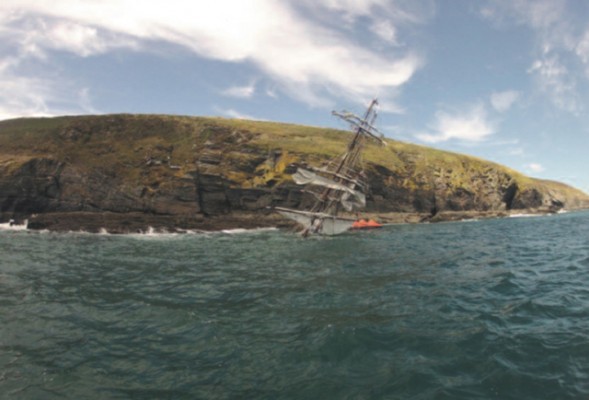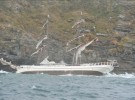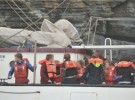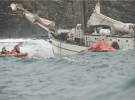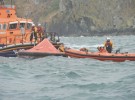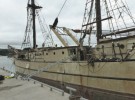An investigation into the grounding of the historic tall ship Astrid, which sank off west Cork, Ireland in 2013, has found a catalogue of failures and breaches of international regulations.
The Marine Casualty Investigation Board (MCIB) report, published on 21 January 2015, highlights poor route planning before the Dutch registered sail training passenger ship set sail past the Sovereign islands with more than 30 people on board.
The ‘immediate cause of the ship grounding and subsequent sinking’ on July 24 2013 was attributed to the loss of power from the main engine. The main engine stopped as a result of fresh water contamination of the fuel.
This was due to ‘human error’ when taking on fresh water in Brighton on 12 July 2013 and then ‘insufficient action’ to remove the fresh water from the fuel system.
The report states that ‘passage planning of the voyage from Oysterhaven to Kinsale was inadequate’ for the Force 6 wind and was ‘influenced by the desire for photograph opportunities for Ireland’s 2013 Gathering initiative.
The hard-hittng report criticised the ineffectual Mayday call, which cost rescuers 10 minutes, and concluded: ‘The ship was not certified as a passenger ship for either EU or international voyages nor were the crew appropriately certified and the ship should not have been at sea.
On board there were 24 trainee sailors aged 15 to 24 from Ireland, Holland, the UK, Franch, Belgium and Spain, a mentor and five crew.
The 42-metre former cargo ship, built in 1924, was one of 50 vessels taking part in a five mile journey as part of the Gathering sailing festival.
The ship set off at 11.00 hrs on 24 July 2013. Half an hour later its sails had been hauled but the engine was still being used. At 11.40 hrs the engine failed and the ship was unable to sail out of the situation.
The Marine Rescue Coordination Centre (MRCC) received ‘a blind call’ from the “STV Astrid” at 11.44 hrs with no position or Mayday. No further information was received, despite the Marine Rescue Sub Centre (MRSC) Valentia making repeated calls on VHF Channel 16.
At 11.54 hrs the yacht Adastra relayed Mayday information from Astrid – “on rocks with 30 persons on-board – 0.5 nautical miles west of Oysterhaven Bay”.
After an unsuccessful attempt by an Irish Sailing Association Rigid Inflatable Boat (RIB) to asist Astrid, the tall ship was blown onto the rocks. No attempt was made to drop either anchor and possibly prevent the vessel going aground.
Twelve passengers were transferred to the RNLI Kinsale Inshore Lifeboat RIB and transferred to the yacht Spirit of Oysterhaven.
The remaining 18 passengers and crew jumped into a liferaft and were towed away from the sailing ship by the RIB. They were transferred onto the RNLI lifeboat from Courtmacsherry. By 13.33 hrs everyone was safely ashore Kinsale.
Astrid sank and was later salvaged in September 2013 but scrapped due to the ‘extent of the damages.
The MCIB report (which can be read in full at www.mcib.ie) found that SOLAS Chapter V Regulation 34 was not complied with.
MCIB investigators made several safety recommendations within the report, including that the master of a ship must retain over-riding authority when taking part in promotional activities and they must not compromise good passage planning or the safety of a ship, crew or passengers.




